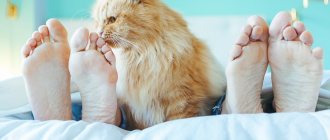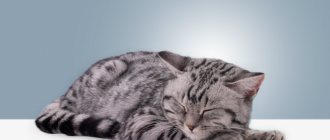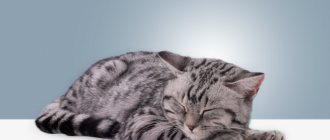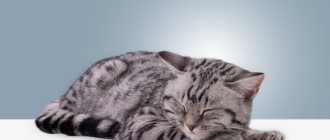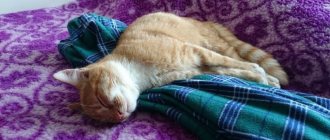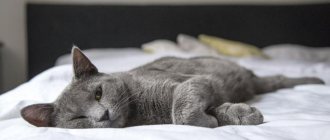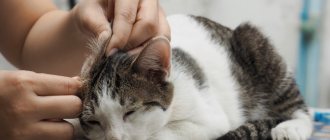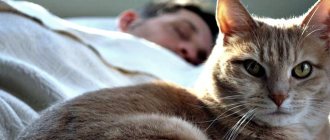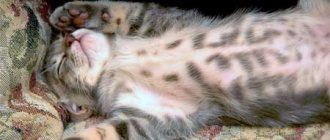Living side by side with such seemingly ordinary animals as cats, owners never cease to be surprised by their mysterious and sometimes mysterious behavior. Cats are credited with not only mystical properties, but also medicinal properties.
Watching how a furry pet goes to bed, household members make various guesses as to why cats sleep at their feet. Some owners believe that this is a good sign - the animal is healing a person in this way, others tend to think that this is how the pet is trying to free itself from its own negative energy.
Reasons for behavior
Despite the fact that cats love and appreciate comfort and warmth, plentiful food and a calm environment, these creatures are not that close to their owners. Fluffy pets do not always let their household know how they are treated, and can be very stingy in showing love and gratitude.
That is why household members are interested in the behavior of their pet, trying to understand what motivates him, for example, to find an explanation for why cats sleep on their feet.
Fans of these graceful animals know that cats spend two thirds of their lives sleeping. Being predators by nature, in the wild these animals sleep for at least 16 hours, saving energy and hiding from enemies during the daytime.
Cats' hearing and sense of smell make them sleep shallow and sensitive. The slightest rustle or barely perceptible sound can instantly wake up a seemingly serenely sleeping pet.
Living with a person, cats adapt to the lifestyle and routine established by the owner of the house. Being nocturnal hunters, pets nevertheless sleep at night with their owners. Often cats choose the owner's bed to sleep, sitting comfortably at the foot.
Modern zoology does not have any scientifically substantiated explanations for why cats like to sleep on their feet. There are several versions and guesses regarding the unusual behavior of pets:
- Energy theory . According to this hypothesis, cats have the ability to transform the negative energy of the biofield of other creatures into neutral. It is believed that during this process the animals do not cause themselves any harm. Most often, pets encounter the energy field of the owner and household members. It is to them that the invisible therapy of furry healers is aimed.
In addition, there is an assumption that a person unconsciously draws energy from space. Being initially positive, after passing through the human body the energy acquires the opposite charge and exits into the ground with a minus sign. Cats, being sensitive to geomagnetic fields, neutralize or transform negative energy.
This theory has many supporters who, not unreasonably, believe that in this way cats prolong the life of their owners.
- Zoologists and veterinary specialists tend to believe that the reason why cats like to sleep on their feet is because they love warmth. Experienced breeders and cat lovers have long noticed that furry couch potatoes choose the warmest places in the house. Cats happily sleep near heating radiators, on warm and soft loungers, and if the owner is already in bed, then a soft bed will be their favorite place.
The pet's desire to find a warm and dry place to sleep is due to the fact that the animal is motionless during rest. To prevent hypothermia during sleep, the cat looks for a warm and safe place in advance. Often pets want to lie on the chest or closer to the owner, but a safer and calmer place is still the legs of the household. Compared to the human body, legs are lighter, and they are unlikely to injure a pet.
- The reason why cats lie on their feet, many fans of these animals consider the ability of furry pets to feel sick and dysfunctional places in the body. Scientific research does not confirm or refute this version. Many owners have repeatedly noted that pets choose sore spots on the human body.
Scientists explain this phenomenon by the fact that most pathologies are inflammatory in nature, in which local body temperature slightly increases. This is imperceptible to humans, but a hypersensitive cat unmistakably detects a warmer area of the body and strives to lie down closer.
- Almost all owners of domestic cats can say with confidence why the cat sleeps at the owner’s feet . Furry pet lovers are unanimous in their opinion that this is how animals show their love and appreciation. Spending most of his life in a state of half-asleep, when else, if not in a dream, to be closer to his beloved owner.
Being cautious by nature and smart creatures, cats do not like to bother with their presence at hand and often choose the most calm and safe place from their point of view - a person’s feet.
Many guesses about the reasons why cats choose a place to sleep near a person’s feet indicate a genuine interest in these unique creatures both by ordinary owners and zoological scientists.
To learn why cats sleep on humans, watch this video:
Recognition or protection of property
A simple answer to the question of why cats sleep at their owner’s feet may be their desire to stay close to a beloved creature that satisfies its whims. The pet understands who:
- gives him food and treats;
cleans the tray;
pays attention. Even while remaining unapproachable, the animal feels gratitude
By perching on the edge of the bed, it shows that it values its companion and hopes for continued cooperation. Defending territory may be another reason why a cat sleeps at a person's feet at night. In the case of mousetraps, it is difficult to tell who owns whom. Cats are confident in their dominant role. Positioned at the feet, they claim ownership of the owner. This habit can develop after major changes in your pet's life. For example, the birth of a child or the appearance of another animal
Even while remaining unapproachable, the animal feels gratitude. By perching on the edge of the bed, it shows that it values its companion and hopes for continued cooperation. Defending territory may be another reason why a cat sleeps at a person's feet at night. In the case of mousetraps, it is difficult to tell who owns whom. Cats are confident in their dominant role. Positioned at the feet, they claim ownership of the owner. This habit can develop after major changes in your pet's life. For example, the birth of a child or the appearance of another animal.
Nestling at your feet - a practical solution
Cats are pragmatic animals. When choosing a place to sleep, they think about comfort as much as safety. The reason why a cat sleeps on its feet at night is because of the optimal combination of these characteristics. At the end of the bed there is a pet:
- gets enough space to spread out;
is less likely to be disturbed by the owner’s restless sleep;
has a good view of the door to the room or to the balcony (depending on the layout).
Sitting at the foot, the pet maintains personal boundaries, remaining in close contact with the owner
This combination is especially important in hot weather. A sleeping person may accidentally hit a cat with his foot at night.
But, sitting next to her, the animal runs the risk of ending up under an overturned body or playing the role of a huggable toy.
Cats are heat-loving creatures. People often wrap their legs more tightly. Having settled down with them, the pet gets the opportunity to sleep on a blanket or blanket. In the nook behind bent knees, the pet will receive a warm, cozy mink. The owner's native scent will help him fall asleep faster. By remaining in close contact with the owner, the cat will maintain its distance and will always know when the owner gets up in the middle of the night. She will not miss the opportunity to beg for a treat once again.
Animals sleeping near the feet have the opposite purpose. This way the cat will maintain contact with the owner, and his sleep will not be disturbed.
The cat lies at your feet - beliefs
Few people have not heard stories about the supernatural abilities of mousecatchers. It is believed that a cat lying down on the threshold communicates with brownies. Staring at one point, the pet watches the other world. Although, according to experts, he “freezes” when he gets ready for bed.
Some owners believe that the reason why cats like to sleep on their feet is the desire of their pets to rid them of negative energy. Pets take away the negative charge accumulated during the day. The legs, as the end point of the body, seem to be a good contact area. Adherents of the energy theory advise not to worry about the influence of negativity on pets. Cats are carriers of a powerful negative charge. The “bad” energy collected from a person helps to fuel their vitality.
Scientists have proven that purring frequencies have a calming, even therapeutic effect on the animal. But people were talking about the healing properties of cats even before such claims. It is believed that the animal finds a sore spot and, sitting on it (nearby), speeds up recovery. The owners can explain the cat’s desire to settle down at their feet by the presence of:
- varicose veins;
joint inflammation;
swelling;
calluses or injuries.
Skeptics explain the desire of pets to settle in a sore spot by pragmatism. Inflammation leads to a local increase in temperature, and the cat is drawn to a warm place. The healing powers of mousetraps are attributed to the placebo effect.
Cats love to sleep with their owners. The pet can find the most comfort at the feet. This is how the cat feels that he is protecting his owner and preventing encroachments on his territory. Energy theories should not be discounted either. Sitting at the owner’s feet, the pet can help get rid of the day’s negativity. Although, more likely, the cat wants to stay close to the owner without the risk of him kicking or cuddling her in the middle of the night.
Why do cats like to sleep at their feet and not next to them?
Cats like to sleep at their feet, not next to them, or do not approach their faces, often due to the hierarchical nature of the relationships between animals, both among themselves and with humans. A cat or cat, which, due to its temperament and disposition, does not claim a leading role in the community, most often chooses a place to sleep at the feet of the owner. With this behavior, the pet shows that it views the person as a leader and leader, recognizing its secondary role.
According to experienced breeders, the location of a cat in the blood is influenced by the character of the pet and its sense of security. If the animal is calm about human movements during sleep and is not bothered by changes in position, then the cat sleeps with pleasure next to the person. However, a shy, fearful pet prefers a safer place - at the feet, since compared to the human body, the legs have less weight and do not frighten the domestic couch potato as much.
A cat who loves comfort and does not tolerate a familiar attitude towards him will never choose human feet for rest.
Is it possible for a cat to sleep between spouses?
Cats have been near humans and have lived in their homes for a long time. They keep the home. These animals must not be beaten, offended, or pulled by their whiskers or tail.
Whether to allow a cat to sleep between husband and wife depends on various factors:
- A cat is capable of marking its territory with a liquid with an unpleasant, pungent odor, especially in cases where it is offended by one of the spouses or feels jealous.
- Couples can quarrel over a cat. If one of the spouses does not like the pet, then she will commit unseemly actions to take revenge.
- A cat that sleeps between a husband and wife interferes with their exchange of energies. When spouses sleep together, they exchange energy. The cat appropriates a particle of energy for itself, and the spouses end up with a disadvantage.
The cat has long been the keeper of the hearth. She must not be frightened, pulled by the tail or offended. Cats are always near us. But is it possible for a cat to sleep between spouses? A few answers that have come to our time from the distant past:
- A sleeping cat between spouses interferes with their libation on an energetic level. If a husband and wife sleep together, they feed off each other’s energy and this helps them to always be together and feel each other even at a distance. The cat takes away some of the energy, and the husband and wife will have a gap in this regard.
- A cat can quarrel between people. If a man does not love her, then she will take revenge and will do everything so that he does not interfere with her living in this house.
- A cat may mark its territory with foul-smelling secretions, especially if it feels jealous of one of its mates.
For what diseases does a cat lie down on its feet?
Even eminent scientists in the field of zoopsychology cannot determine exactly what diseases cause a cat to lie down. It is believed that mustachioed healers occupy this position in case of diseases of an inflammatory nature - arthritis, myositis. Pathological processes accompanied by inflammation are characterized by an increase in local temperature in the affected area (joints).
Cats very sensitively sense the slightest change in the environment and react even to a slight increase in temperature, choosing a warmer place to rest. And if the owner often notices that the cat goes to sleep on his feet, the health of the joints should be checked.
Felinotherapy
Some scientists believe that the human body is an analogue of an electric battery, in which the head is the positive pole, and the charge with a minus sign is located in the legs. Pets sensitive to electromagnetic fields prefer to sleep at the feet of a person, thereby, as it were, removing negative energy. This theory appealed to cat lovers who consider these animals to be natural healers.
Ringworm and other types of skin mycoses
Ringworm is a skin disease accompanied by:
- the formation of a small rash;
- damage to fur and claws.
This disease can occur due to a viral infection or reduced immunity of the animal.
There are the following factors that contribute to the development of lichen in pets living at home:
- walking outside without supervision;
- treatment with immunosuppressants;
- malnutrition;
- parasite infection;
- malignant formations.
The most common causes of ringworm in cats are those caused by fungal infections. There are several types of lichen:
- Ringworm, which is based on fungal diseases. This type is easily transmitted to humans, especially to young children. Fungal spores remain viable for 5-10 years because they are resistant to environmental influences.
- Versicolor or pityriasis versicolor, which is a dangerous disease. The cause of its occurrence is a yeast-like fungus, which under certain conditions transforms into a pathogenic form.
- A shingles or pink appearance that appears when immunity is reduced and is of an allergic nature.
- Eczema or tinea versicolor manifests itself in animals as an allergic reaction to a specific irritant and is not transmitted through contact with humans or other animals. Allergies can be caused by exposure to household chemicals, a malfunction within the body, or stress.
All types of lichen in cats have common symptoms:
- hair loss;
- inflammation of the skin accompanied by peeling;
- change in pigmentation;
- severe scabies.
If you suspect lichen, the cat should be isolated immediately. A glazed balcony, loggia or separate room is suitable for this; you need to make sure that the room is warm. After this, you need to contact a veterinarian to establish through diagnostics the cause of the cat’s itching and methods of treating it.
To prevent such diseases from occurring in cats, it is recommended to periodically vaccinate them for preventive purposes.
If a cat comes to your feet and licks itself
If a cat comes to your feet and licks itself, this behavior usually indicates the animal’s trust and affection for the person. Licking fur is considered by zoologists as a ritual of “shedding” one’s scent. Manipulation helps the pet find a common language with its relatives.
In relation to a person, a cat acts in the same way, considering him a member of his family. Therefore, if a pet climbs into the legs and begins to lick itself, then this behavior indicates that the cat trusts and feels gratitude and love for the family member.
Other places where your four-legged pet sleeps
The bed was sorted out. But our pets sometimes choose such strange places to sleep that it’s amazing! Why do they do this?
The cat sleeps on the table
- Mystical explanation. The purr “keeps” someone in the family, promising him illness or death. And if the table is in the kitchen, then the jealous young lady, through her actions, drives the man out of the house.
- Realistic explanation. From a height, the animal has a better view and control of the territory, children won’t reach the cat on the table, and the nearby kitchen is also full of all sorts of tempting smells.
There is no need to be afraid of signs. Remember: according to many beliefs, a cat can sacrifice itself in order to ward off trouble from the house. Well, will she click on her favorite owners? Of course not. However, you still need to wean your pet off the new habit. A table, especially a kitchen table, is a place that must be exceptionally clean. And a sign about a man can work if your husband has to eat food seasoned with cat hair every day.
On the threshold
Legends consider the home threshold to be the brownie's favorite hiding place. And cats are his constant interlocutors and loyal friends. Previously, in Rus' it was believed that the rodent exterminator dozing on the threshold was having a leisurely conversation with the house spirit, so there was no need to disturb them under any circumstances. This is in your own interests!
The pet doesn’t just bask in the sun, it solves important issues!
But people have nothing to do in this place. If you disturb the mysterious inhabitants of the invisible world, you will get yourself into trouble.
Other
- If the cat settles down to sleep on a travel bag or suitcase, the journey will be easy and favorable. If he tramples on an already assembled backpack, throws things out of it, or, what’s more, tries to urinate on them, it’s better to postpone the trip.
- The cat sleeps by the radiator, fireplace or on the windowsill, exposing its back to the sun's rays - it will soon get colder, and this weather will last a long time.
- Sleeping spread out in the middle of the room? Either the thaw is approaching, or she completely trusts you. Be proud, you are a great host!
We have mentioned many times about the ability of cats to have a beneficial effect on human health. But sometimes it happens that it’s a furry animal that needs help. If your pet suddenly changes its habits, climbs on your arms and chest, and demands attention, its behavior may indicate that not everything is all right with the animal. Watch her more closely, and if your suspicions are confirmed, take Murka to the vet.
Cats sleep where they want, how they want and as much as they want. The average duration of their sleep is 15–16 hours, sometimes it extends to 20 hours a day. While in a city apartment, they accumulate energy for a successful hunt
Small predators need strength to track, chase, make a decisive throw and fight for the safety of their prey, and it doesn’t matter that all this is realized only in games with the owner or independent training. A cat's sleep pattern is influenced by its natural need to receive as much information as possible about its environment, which explains why it prefers to sleep in fits and starts but stay in the thick of things.
How cats choose who to sleep with
A cat’s choice of whom to sleep with is influenced by the animal’s individual characteristics, its morals, and attachment to a particular family member. Some pets happily relax with the head of the family, climbing on the man’s head or chest, or prefer to sleep at the feet. Other cats choose only their owner to sleep and categorically do not want to sleep next to their husband.
Scientists explain the choice of a pet not only by its attachment to a specific person, but also by the theory of smells. Long-term observations of mustachioed friends have shown that it is the smell of a person that is decisive for a cat in matters of friendship and love. If an animal considers him “one of its own,” then it recognizes this person as a leader, leader, and gladly chooses him as a companion during sleep.
Emotional
Like any living creature, cats need not only physical comfort, but also emotional comfort. Having a pet, a person bears full responsibility for it - feeding, caring for, playing, caressing and pampering. It is not surprising that animals perceive their owner as a “mother” and subconsciously reach out to him for another portion of care and love.
It is the desire to feel calm, safe and protected that prompts cats to seek refuge in their feet, perceiving them as the most reliable refuge.
Why does a cat sleep near a child?
According to experts, there are several reasons why a cat sleeps near a child:
- first of all, the animal is not afraid of the small size of the child, it feels safe, as if on equal terms;
- cat lovers believe that they sleep with children also because in this way they show their affection and love for all family members;
- Scientists believe that animals choose the company of young children because the temperature of a child’s body is higher than the body temperature of an adult.
Cats are not allowed to be photographed
Besides the threat of facing your own death ahead of time, there are three arguments against photographing cats:
Photography can shorten your pet's life. There is an opinion that the image takes away his soul, and this only affects cats, and forces cats to leave the house. The theory is very controversial, as is the fact that cats have a soul.
Flashlight can impair an animal's vision. A completely reasonable statement. Cats are nocturnal animals and their eyes are not adapted to intense light exposure. There may not be any long-term or irreversible effects on the eyes, but perception may be temporarily affected.
He may feel stressed and afraid. This is true and especially true for animals that are not accustomed to posing in front of cameras.
We should also not forget that cats are indifferent to photography, people need it, therefore, for the sake of your own ambitions, you should not jeopardize the health and comfort of your pet.
Features of cat sleep
Watching how your furry pet sleeps serenely, you can notice interesting features of its behavior:
- Even a cat that seems to be deeply asleep at first glance does not stop reacting to environmental stimuli. Watching carefully, you can see how the whiskers, tips of the ears, eyelids and paws of the animal twitch.
- Foreign neurophysiologists claim that cats dream. Scientists believe that most often they dream of hunting or skirmishes with enemies.
- Furry pets have two stages of sleep: napping and deep sleep. During the first, the animal's muscles remain tense and the metabolism slows down. During this phase, the animal wakes up very quickly at the slightest external stimulus.
Deep sleep is characterized by complete relaxation of the animal's muscles (cats often fall during this process if they fall asleep on a hill). A cat emerges from such sleep much more slowly than from a nap.
- Cats have approximately three times more REM sleep than humans.
- Newborn babies sleep only in deep sleep; their drowsiness phase is not developed.
Spending most of their lives sleeping, pets sometimes choose the most unexpected places to rest: washing machines, closet shelves, carelessly left bags or baskets, etc.
We recommend reading about how to stop a cat from scratching wallpaper and furniture. You will learn about the causes of property damage, methods aimed at eliminating this problem, cutting nails, and eliminating stress factors.
Here's more information on how to trim a cat's claws.
What is a cat's sleep phase?
As mentioned, a cat's sleep phase is divided into a series of naps and deep sleep stages. Napping is usually a quick nap where the cat remains relaxed but at the same time alert to what is happening outside.
If a cat stays in this stage of sleep long enough to feel safe, it will eventually enter REM or deep sleep. When your cat is in deep sleep, you may notice that she shakes or moves while she sleeps.
This movement also tells us what cats dream about and what they can essentially dream about. When cats are daydreaming and in REM sleep, they may also perceive external stimuli (such as the smell of their food) and respond as if they were awake (moving their nose to pick up a scent).
In conclusion, it can be said that if a cat spends a long time sleeping, this is completely normal and necessary. The only time we would suggest that you would be a little concerned is if your cat sleeps more than these average hours.
Additionally, if your cat does not get up to eat, drink, play, or urinate during the sleep phase, caution should be exercised and a veterinarian should be consulted.
Favorite places to sleep and their organization
Having gained fame as lovers of sleep, cats are nevertheless scrupulous when choosing a place to sleep. First of all, the overnight shelter or nest for daytime rest should be warm, dry, and calm. That is why the pet often chooses the owner’s bed, a place near the radiator, or a shelf in a cabinet. For the same reason, cats often prefer to sleep on a sunny windowsill, which is warm even in winter thanks to the heating system.
Many animals like to rest and sleep in an elevated place, believing that it is safer. In the wild, this habit is due to the fact that it is easier to see the enemy from a high place. Often cats try to choose a dark and quiet place, for example, in a closet, in a box, etc. As a rule, the pet changes its sleeping place during the day.
The fact that a cat sleeps at their feet does not please every owner. Some people are advised not to sleep in the same bed with a furry couch potato:
- pregnant women;
- children under 3 years old;
- for allergy sufferers;
- people suffering from somnambulism (walking in their sleep).
If for some reason the owner cannot or does not want the pet to sleep at his feet, he should purchase or independently build a special bed for him. Teaching an animal to sleep in a specially designated place is not as difficult as it might seem at first glance.
Noticing how a cat sleeps at his feet, what this means interests every curious owner of a furry homebody. Despite the variety of versions explaining this phenomenon, a caring owner will choose the one that, in his opinion, best characterizes his beloved pet.
Negative aspects
You should not sleep with an animal on the same bed in the following cases:
- Restless sleep. When a person often tosses and turns, turns from one side to the other, you can inadvertently crush the paw or tail of an animal. In addition, cats sleep soundly and may not find their way in time. In this case, it is better to give your pet a separate sleeping area;
- Allergy to wool. Some people react particularly sharply to cat hair, they begin to sneeze, runny nose, and exhibit other allergic symptoms;
- Woman's pregnancy. It is recommended to wean your pet from the habit of sleeping on the same bed with its owner, since when the child is born, he will constantly be next to his mother;
- Birth of a baby. The proximity of a cat and a baby on the same bed is not recommended in order to avoid injuries from both the child and the pet. If a cat walks outside during the day and sleeps at home at night, it is worth limiting his access to the master’s and children’s beds, as he can bring home an infection or some parasites, infecting the baby.
[custom_ads_shortcode3]
Useful video
Watch this video about what diseases cats can treat:
Similar articles
- Why does a cat rub against the legs of people, the owner, what does it mean...
You will learn about the reasons for this behavior of a pet, the characteristics of a cat's sleep, the favorite places to sleep in... Experts in the field of animal psychology consider the behavioral line to be the reason why a cat rubs against its legs. Read more - Why do cats crush people with their paws, why do cats...
We recommend reading about why cats sleep at their owner's feet. You will learn about the reasons for this behavior, the characteristics of cat sleep, and favorite places to sleep. And here is more information about how to remove a cat from a tree yourself and with... Read more
- How to stop a cat from biting, scratching, what to do if...
If there is a bully in the house, you have to decide how to stop the cat from biting or scratching. What should owners do if the cat is angry and bites when you pet it? How to stop a cat from scratching its legs? Read more
- Why cats love valerian: how it works...
Many animals, after overstimulation of the nervous system, fall into a long, uninterrupted sleep. ... Why do cats crush people with their paws, why do cats... Why do cats sleep in their feet: what does this mean, why do cats... Read more
- Why does a cat drool from its mouth: causes and treatment
Should I be concerned if my cat is drooling? Any owner should understand that if a cat is drooling from its mouth, this is a physiologically abnormal phenomenon; there is always a reason, which is extremely important to determine. Read more
Experts' opinion
Veterinarians believe that cats sleep in or on their feet for several reasons, the main ones of which have already been mentioned. These include love for the owner, a desire to warm up, and jealousy.
A cat may be jealous of children or animals living in the same house as it. Lying at the feet of the owner, she seems to say: “this is mine,” demonstrating to others her closeness to her loved one.
Cats are cunning creatures that are sometimes underestimated by many breeders. These cute fluffies always love to nestle in the warmest places, which are human feet. However, there are versions that in this way pets have a healing effect on the owner, balancing energy. Unfortunately, there is no scientific evidence for this.
… …
